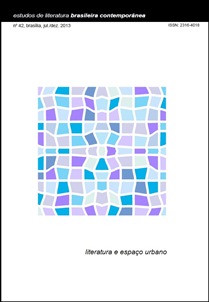Trabalho artesanal e trabalho industrial como elementos de sociabilidade, subjetividade e tragédia em “A mão esquerda”, de Roniwalter Jatobá
DOI:
https://doi.org/10.1590/S2316-40182013000200012Abstract
Este artigo analisa o conto “A mão esquerda”, do escritor Roniwalter Jatobá, focalizando a questão do trabalho artesanal como elemento de sociabilidade, subjetividade e ontologia, e o trabalho fabril urbano como elemento de despersonalização, desagregação e tragédia. A análise se fundamenta em teóricos do romance, Bakhtin (1988), e da sociologia do trabalho, Engels (1990) e Lukács (1980), destacando a construção do espaço, da linguagem, da intertextualidade, do foco narrativo e do contexto histórico.
References
BAKHTIN, Mikhail (1986). Marxismo e filosofia da linguagem. Tradução de Michel Lahud e Yara Frateschi Vieira. São Paulo: Hucitec.
________ (1988) Questões de literatura e de estética: a teoria do romance. Tradução de Aurora Fornoni Bernardini et al. São Paulo: Hucitec.
ENGELS, Friedrich (1990). O papel do trabalho na transformação do macaco em homem. 4. ed. Rio de Janeiro: Global.
LEROI-GOURHAN, André (1964). O gesto e a palavra I: técnica e linguagem. Lisboa: Edições 70.
LUKÁCS, György (1968). Ensaios sobre literatura. 2. ed. Rio de Janeiro: Civilização Brasileira.
________ (1980). The ontology of social being: labour. Londres: Merlin.
JATOBÁ, Roniwalter (1979). A mão esquerda. In: Crônicas da vida operária. São Paulo: Linoart; Círculo do livro.
SENNETT, Richard (1998). The corrosion of character: the personal consequences of work in the New Capitalism. New York: Norton.
Downloads
Published
Issue
Section
License
Authors who publish in this journal agree to the following terms:
a) The authors maintain the copyright and grant the journal the right of first publication, the work being simultaneously licensed under the Creative Commons Attribution License-Non Commercial 4.0 which allows the sharing of the work with acknowledgment of the authorship of the work and publication this journal.
b) Authors are authorized to enter into additional contracts separately, for non-exclusive distribution of the version of the work published in this journal (eg publish in institutional repository or as a book chapter), with authorship recognition and publication in this journal.
c) Authors are allowed and encouraged to publish and distribute their work online (eg in institutional repositories or on their personal page) after the editorial process, as this can generate productive changes, as well as increase the impact and citation of published work (See The Effect of Free Access).
d) The authors of the approved works authorize the magazine to, after publication, transfer its content for reproduction in content crawlers, virtual libraries and the like.
e) The authors assume that the texts submitted to the publication are of their original creation, being fully responsible for their content in the event of possible opposition by third parties.


